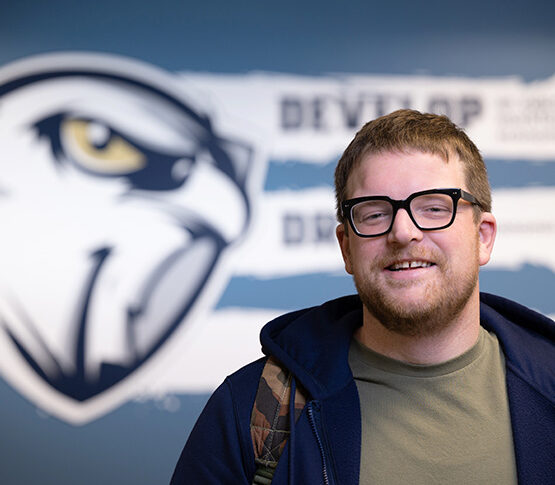Behavioral Health Studies
Associate in Applied Science
Begin a career in the mental health field. Dive into topics of trauma and recovery, vocational rehabilitation, human development, victim advocacy, and more. In addition to their degree our graduates are also eligible to apply for the Mental Health Rehabilitation Technician Community Certification (MHRT/C) and Victim Advocate Certification.
-
Program tracks
Full-time
Part-time
Online -
Estimated Degree Completion Time
4 semesters, 61 credit hours
Degree questions, answered.
Have questions about the Behavioral Health Studies program? Fill out this form and we’ll get in touch with you.

"*" indicates required fields
Courses
Our courses cover multiple aspects of human services, including counseling, psychology, trauma and recovery, addiction and substance abuse, social problems, and victim advocacy. You’ll build your knowledge of theories and research methods, with an emphasis on career options.
Behavioral Health Studies Course Descriptions
HUS 101 – Introduction to Human Services
3 credits/3 contact hours
This course explores multiple aspects of human services including the history, models of service delivery, diverse populations, helping skills, and ethical considerations. There is an emphasis on career options within the fields of behavioral health and gerontology. Students will have the opportunity to explore areas of vocational interest.
PSY 210 – Psychology Across the Lifespan
3 credits/3 contact hours
This course focuses on the theories, research methods, and the status of scientific knowledge about human development across the lifespan. Topics include the interplay of psychological and environmental factors in physical, cognitive, social and personality development from birth through adulthood.
Prerequisite: PSY 101
PSY 230 – Abnormal Psychology
3 credits/3 contact hours
This course examines the major diagnostic, etiologic, and treatment issues for mental health disorders identified in the Diagnostic and Statistical Manual of Mental Disorders. Specifically, the course will examine disorders related to anxiety, stress and trauma, mood, schizophrenia, eating and substance abuse, memory and organic dysfunctions, and personality. The concepts of normality and abnormality will also be explored along with related legal, ethical, and sociocultural issues. Prerequisite: PSY 101
PSY 232 – Introduction to Counseling
3 credits/3 contact hours
An introduction to various theories of behavior change, including dynamic, behavioral, cognitive, humanistic, and existential approaches to therapy. Individual, group, and family therapies will be discussed.
Prerequisite: PSY 230 (can be taken concurrently)
PSY 234 – Trauma and Recovery
3 credits/3 contact hours
This course will provide an overall theoretical basis for trauma assessment and intervention. Students will learn concepts of trauma theory, treatment options, and stages of recovery. The psychological and biological effects of trauma will be examined and clinical outcomes for the major trauma-specific disorders will be explored.
Prerequisite: PSY 230 (may be taken concurrently)
PSY 228 – Addiction and Substance Abuse
3 credit hours/3contact hours
This course provides an overview of four primary aspects of addiction: the physiology of drug abuse and chemical addiction, the assessment and diagnosis of chemical dependency, the treatment of addictive disorders, and topics focused on other forms of addiction. Various causes of addiction including family functioning, genetics, and cultural/societal influences will also be examined. Prerequisite: PSY101
PSY 244 – Psychosocial Rehabilitation
3 credits/3 contact hours
This course will examine psychosocial rehabilitation as a core organizing principle of all behavioral health care. The philosophies and values of psychosocial rehabilitation and their application in essential client services will be examined with a focus on diagnosis, treatment options, and recovery models. Attention will be given to the experience of disability, components of service delivery, and the importance of collaborative planning.
Prerequisite: PSY 230
SOC 136 Race, Gender, Class, and Ethnicity
3 credits/3 contact hours
This course will examine diversity through the perspective of multiple dimensions including race, ethnicity and national origins, gender and gender identity, sexuality, class and religion. Discrimination in housing, employment, banking, the criminal justice system and other institutions will be examined. The coursework will provide opportunities for students to become aware of their own beliefs, biases and prejudices and discuss both personal and social responsibility to create inclusive communities in an increasingly complex world.
SOC 210 – Social Problems
3 credits/3 contact hours
This course will develop students’ skills of critical analysis through the application of sociological principles to current social issues. Examples of issues which may be examined are: stratification and inequality around the globe, poverty, health care, homelessness, aging, racial/ethnic conflict, gender roles and national and global conflict.
Prerequisite: SOC 101
SWO 110 Introduction to Victim Advocacy (cross referenced with CJS 110)
3 credits/3 contact hours
This course in an introduction to victim advocacy and successful completion leads to certification, at the provisional level, as a Victim Advocate by the National Advocate Credentialing Program. The course explores topics related to advocacy through both a criminal justice and human service lens including: legal terminology and processes in the criminal and civil justice system, victims’ rights legislation, cultural competency, trauma, crisis intervention, and ethics.
Learning Outcomes
Students will be able to:
- Engage in assessment and collaborative service planning with clients, their families, and human service professionals while understanding the potential barriers clients may face in accessing resources.
- Utilize technical skills to effectively gather, analyze, evaluate, and share data while following legal and ethical guidelines for using confidential information.
- Demonstrate an awareness of personal and professional development in order to best serve clients and self.
- Communicate the importance of inclusion, cross-cultural sensitivity, and diversity.
- Explain the ethical principles involved in the human service field and how situational factors might impact the interpretation of those principles.

Careers
Behavioral Health Studies associate degree graduates will be eligible for entry level employment at hospitals, schools, social service and mental health programs, community health centers, and child care settings.
Meet the Faculty
-

Cathleen Ferrick
Chair - BHS/Gerontology, Faculty - Psychology
Cathleen Ferrick is the chair of the Behavioral Health Studies, Gerontology, Forensic Social Work, and Criminal Justice programs. In addition to teaching, she also has many years of clinical experience in the human service field in a wide range of areas including child protection, adoption, crisis intervention, and court investigations. Cathleen has a BA in Psychology and an M.Ed. in Counseling Psychology as well as the Mental Health Rehabilitation Technician Community (MHRT/C) credential and a post-graduate certificate in Trauma Informed Expressive Art Therapies.

